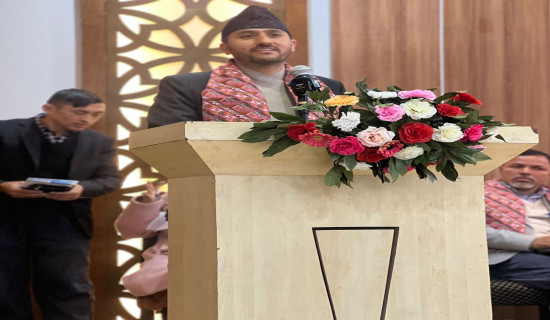- Wednesday, 24 December 2025
Glimpses On Nepal's Staple Diet
Though Nepal is conventionally classified as an agrarian economy and calls agriculture the mainstay of its economy, the designation is increasingly becoming irrelevant, if not outright outdated and even ridiculous, if we see the current status of agriculture. While everybody realises that Nepal's progress and prosperity squarely lie in the scientific development of our agricultural sector with emphasis on agro-based industries and high-yielding varieties of crops, including cash crops, precious little seems to have been done in the form of organised endeavours towards this end.
Against the background of the proverbial lip service being paid to our agriculture by successive governments, Bhola Man Singh Basnet's new book focusing on rice production, as the very title of the book suggests, is a welcome step in terms of literature on practical aspects of agriculture in Nepal.
It is all the more important that Basnet, a principal agronomy scientist with specialisation in the development of various strains and variants of rice and once the darling of the media in terms of his mastery of the subject, has taken the initiative in imparting education to all by focusing on the production and self-sufficiency of the major staple diet of the country.
The book has a self-explanatory title, Dhanma Aatmanirvartako Paato: Baali Bigyanko Byabaharik Baato, that can roughly be translated as Aspect of Self-Reliance in Rice: A Practical Way in Crop Science. Though the length of the book is comparatively short, the content and message it tends to convey have wider ramifications if we really intend to take Nepal on the much discussed but less practiced road to socio-economic transformation. While the author sadly passed away on August 14, 2021, after the deadly onset of COVID-19, his spouse, Anjali Basnet, and his two daughters (engineer Pragya Basnet and Dr. Bidushi Basnet), have taken the most welcome lead to get the manuscript left by the late Basnet printed in book form.
Hailing from the famous Shreepali branch of the Basnet family, Bhola Man Singh Basnet has appropriately dedicated the book to two of the most famous heroes of our history, Commander Kaji Shivaram Singh Basnet and Commander-in-Chief Kaji Abhiman Singh Basnet, his parents, Govinda Man Singh Basnet and Krishna Kumari Basnet, and the entire farmers of Nepal, for whose well-being and prosperity he fought his whole life.
One of the most important attributes of the book is the comprehensive eight-page preface written by the author.
In his introduction to the endeavour he left for posterity, Basnet gives a cogent history of the evolution of rice, which is believed to have a long history dating back 10,000 to 15,000 years. Basnet defines rice as the very essence of Nepali civilization and behaviour, as people have the customary habit of starting chats by first asking if someone has eaten rice to eloquently denote the role of the staple crop in our dietary requirements.
Likewise, in her brief introduction, Anjali Basnet has portrayed her late husband as a committed rice fan, both during his service days and post-retirement period until his sad demise, and a relentless scientist completely dedicated to making Nepal self-sufficient in rice.
Divided into 21 briefs but highly compact and succinct chapters, the laudable work may be called a complete handbook in our context as it deals with types of rice strains and variants, opinions of international organisations on the relevance of rice cultivation and its role in the national economy and even international trade, cropping patterns, seedlings and preparatory exercises, planting and harvesting, etc.
The book gives a cogent analysis of problems facing Nepali agriculture, especially in the context of rice farming and the need for sufficiency in production in view of increasing population pressure and the rising price of all agricultural products and inputs, including those involved in rice cultivation.
With all scientific data and statistics showing Asia as the preponderant region for rice production, the book also includes the author's personal experiences in various fields, including the moment he was awarded the RONAST (now with a new nomenclature, the National Academy of Science and Technology (NAST) after the dawn of republican order in the country) Science and Technology Award from King Birendra.
The author seems to lament the increasing import of rice from India, as we seem to have given deaf ear to the sense of urgency that should have governed our policy in terms of augmenting rice production.
Besides being a close friend and well-wisher, Bhola Man Singh Basnet remained important for us for at least three things. First, he was possibly one of the best and most highly motivated rice experts in the country who visualised Nepal as not only agriculturally self-reliant but also with the potential to become a rice exporter, a status it long enjoyed at least until two or three decades earlier. It was once one of the largest exporters. Basnet's dream eloquently coincides with the feeling of our foremost foreign policy expert, Professor Yadunath Khanal, who once said that self-reliance in agricultural produce was one of the best guarantees of a sustained and independent foreign policy for a country like us.
Second, Basnet was keenly interested in the domain of foreign affairs and diplomacy, as he used to talk of increased and selective cooperation with countries and institutions to upgrade and promote our agricultural sector. He used to lament the decay of some specific research institutions established by foreign countries with an eye on making Nepal a hub for the production of some of the most important agricultural products.
Third, the author was the son-in-law of one of our old diplomats, Dill Bahadur Basnet, who served in Myanmar (then Burma) and Kolkata for several years and was possibly influenced by him in terms of international cooperation, particularly in the field of agriculture and crop science, so as to make Nepal's agricultural sector more attractive and self-supporting to the majority of the population.
I extend heartfelt tributes to Bhola Man Singh Basnet, who sadly passed away at 72 but left an important legacy for all of us in terms of rice production. At the same time, I salute Anjali Basnet and her two daughters, as well as all those involved in the publication of the wonderful book, as a living tribute to a late scientist with a strong commitment and purpose.
(Dr. Bhattarai is a former foreign secretary, ambassador and author. )
















